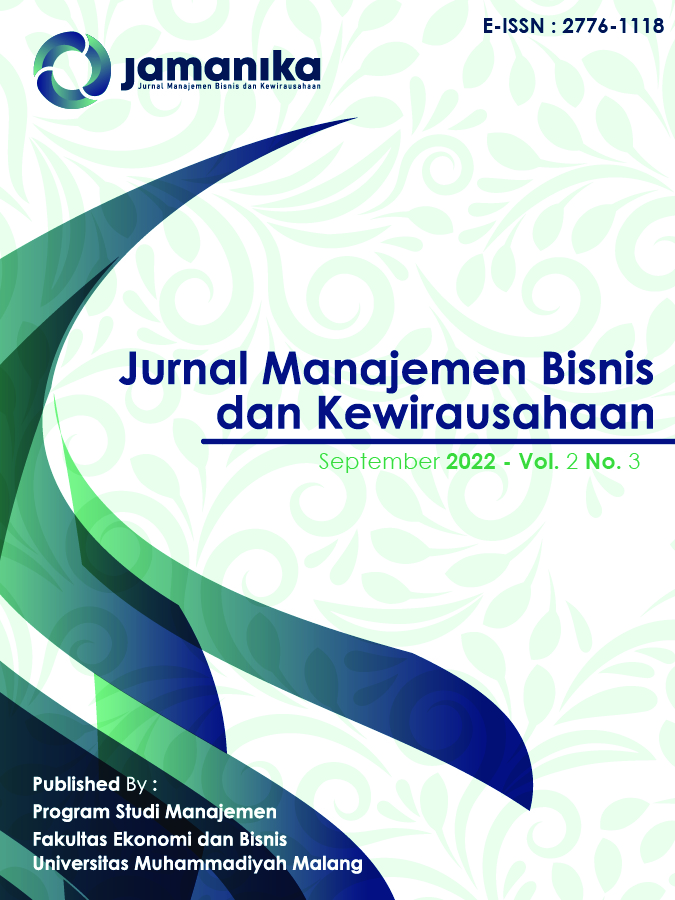The Effect of Organizational Climate on Intention to Stay with Employee Engagement as Intervening Variable
DOI:
https://doi.org/10.22219/jamanika.v2i03.22750Keywords:
Organizational Climate, Intention to Stay, Employee PerformanceAbstract
This study aims to analyze and determine the effect of organizational climate on intention to stay with employee engagement as an intervening variable in Bea Cukai Office Malang. The sampling technique used the purposive sampling technique with a total sample of 50 employees. Data collection techniques in this study used a questionnaire. The data analysis technique used path analysis with the Statistical Product and Service Solutions (SPSS) program. The results of this study indicate that organizational climate has a positive and significant effect on the intention to stay, the organizational climate has a positive and significant effect on employee engagement, employee engagement has a positive and significant effect on the intention to stay, the organizational climate has a positive and significant effect of intention to stay with employees. engagement as an intervening variable
Downloads
References
Abraham, Susan. 2012. “Job Satisfaction as an Antecedent to Employee Engagement.” SIES Journal of Management 8(2): 27–36.
Atmaja, et al. 2020. “Hubungan Antara Iklim Organisasi Dengan Work Engagement Pada Karyawan Perusahaan Supermarket Di Yogyakarta.” Prosiding Seminar Nasional Magister Psikologi Universitas Ahmad Dahlan: 21–32.
Castle et al. 2007. “Job Satisfaction of Nurse Aides in Nursing Homes: Intent to Leave and Turnover.” Gerontologist 47(2): 193–204.
Govaerts et al. 2011. “Influence of Learning and Working Climate on the Retention of Talented Employees.” Journal of Workplace Learning 23(1): 35–55.
Higgs, Jeanne. 2011. “Social Support, Psychological Conditions and Work Engagement as Predictors of Intention to Stay.” Angewandte Chemie International Edition 6(11): 951–52.
Johanim, Johari et al. 2012. “Promoting Employee Intention to Stay: Do Human Resource Management Practice Matter.” International Journal of Economics and Management 6: 396–416.
Kyndt et al. 2009. “Employee Retention: Organisational and Personal Perspectives.” Vocations and Learning 2(3): 195–215.
Mowday et al. 1984. “Psychology of Withdrawal Process : Test ’ s Intermediate of Mobley Model of Turnover Linkages in Two.” The Academy of Management Journal 27(1): 79–94.
Mrayyan, Majd T. 2008. “Predictors of Hospitals’ Organizational Climates and Nurses’ Intent to Stay in Jordanian Hospitals.” Journal of Research in Nursing 13(3): 220.
Olivia, S. & Prihatsanti, U. 2017. “Hubungan Antara Iklim Organisasi Dengan Work Engagement Pada Anggota Sabhara Polda Jateng Semarang.” Jurnal Empati 6(4): 354–61.
Praborini et al. 2021. “Peran Kepemimpinan Transformasional Dan Kepuasan Kerja Terhadap Niat Untuk Tinggal Dengan Keterikatan Kerja Sebagai Mediasi ( The Role of Transformational Leadership and Job Satisfaction on Intention to Stay with Job Engagement as Mediation ).” EKOMABIS: Jurnal Ekonomi Manajemen Bisnis 2(2): 99–112.
Pramadhita at al. 2019. “Hubungan Antara Iklim Organisasi Dengan Work Engagement Pada Karyawan PT. X Surabaya.” Jurnal Fenomena: 1–15.
Rachmatan et al. 2018. “Hubungan Antara Keterikatan Kerja Dengan Intensi Keluar Kerja Pada Karyawan Swalayan Di Banda Aceh.” Journal Psikogenesis 6(1): 1–10.
Schaufeli, W.B. & Bakker, A.B. 2004. “Utrecht Work Engagement Scale Preliminary Manual Version 1.1.” Occupational Health Psychology Unit Utrecht University: 1–60.
Suwandana, I Gusti Made. 2017. “Pengaruh Iklim Organisasi Terhadap Turnover Intention Dengan Kepuasan Kerja Sebagai Variabel Mediasi.” E-Jurnal Manajemen Unud 6(5): 2417–44.
Vong, Louis et al. 2018. “Does Organizational Climate Moderate the Relationship between Job Stress and Intent to Stay?” Journal of Chinese Human Resource Management 9(1): 2–20.







